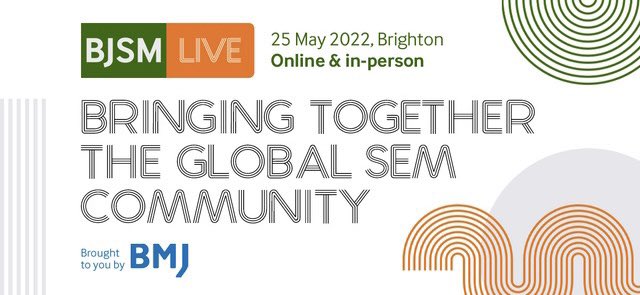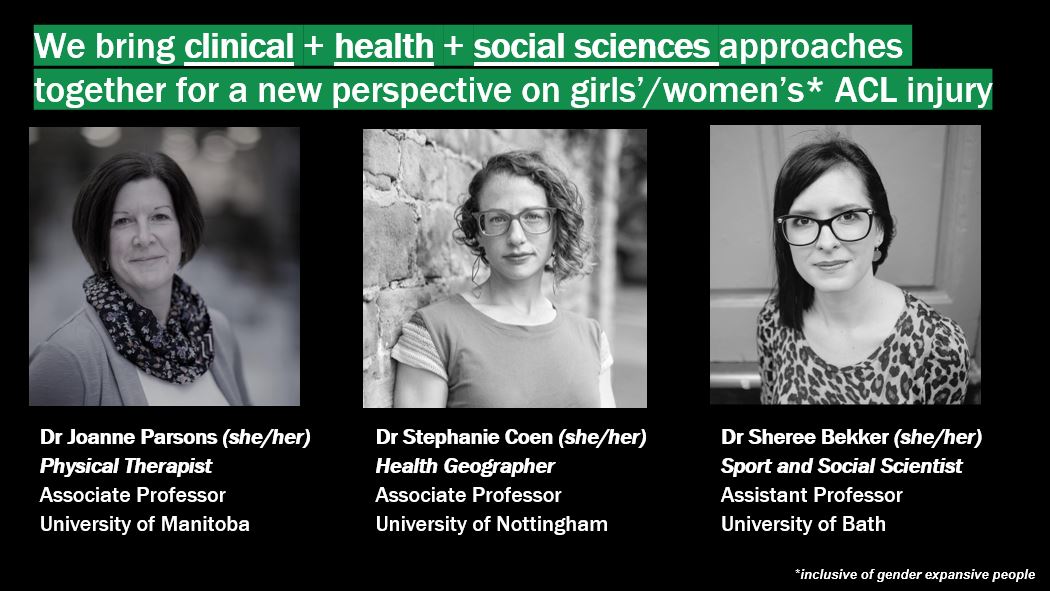
Good morning from #BJSMLive22 everyone
@BJSM_BMJ EiC @DreznerJon and conference Co-Chairs @FionaWilsonf and @osmanhahmed welcoming us in-person and online
@BJSM_BMJ EiC @DreznerJon and conference Co-Chairs @FionaWilsonf and @osmanhahmed welcoming us in-person and online

I think will be a day of really important Sport and Exercise Medicine conversations, including on:
- PA promotion
- Low back pain
- Safeguarding
- COVID-19
- What should SEM look like in the 2020s?
#BJSMLive22
bit.ly/3oY6XUB
- PA promotion
- Low back pain
- Safeguarding
- COVID-19
- What should SEM look like in the 2020s?
#BJSMLive22
bit.ly/3oY6XUB
So proud that our relatively new @UniofBath research centre @CHi2PSBath is so well-regarded and represented at #BJSMLive22
We research injury and illness prevention in sport, and have a stellar team 🤩
We research injury and illness prevention in sport, and have a stellar team 🤩
https://twitter.com/chi2psbath/status/1529369477539942401
First up at#BJSMLive22 is @CanRehab and @ABSPhysio on physical activity for clinical populations with @sophiacandappa joining for the discussion
This this this ⬇️
This this this ⬇️
https://twitter.com/chi2psbath/status/1529383789675393025
For anyone who wants to read more:
https://twitter.com/BJSM_BMJ/status/1529384779661164544?s=20&t=RXYd6s1VG22wOamfxBbYfw
And here is the podcast episode
https://twitter.com/BJSM_BMJ/status/1529383638894268417?s=20&t=RXYd6s1VG22wOamfxBbYfwpo
#BJSMLive22
I asked the panel about the need for a move from 'female athlete health' specifically to an approach that is more inclusive of gender expansive people
Wonderful to hear @ABSPhysio speak to trans inclusive resources currently in development
I asked the panel about the need for a move from 'female athlete health' specifically to an approach that is more inclusive of gender expansive people
Wonderful to hear @ABSPhysio speak to trans inclusive resources currently in development
#BJSMLive22
Next up: Low back pain in athletes with @KellieWilkie @FionaWilsonf @JaneSThornton with James Foad joining the discussion
bjsm.bmj.com/content/55/11/…
Next up: Low back pain in athletes with @KellieWilkie @FionaWilsonf @JaneSThornton with James Foad joining the discussion
bjsm.bmj.com/content/55/11/…
And here is a @BJSM_BMJ blog post and podcast episode on empowering patients to take control of their back pain
blogs.bmj.com/bjsm/2020/09/1…
blogs.bmj.com/bjsm/2020/09/1…
[CN: harassment and abuse}
#BJSMLive22
Really wonderful to see @JaneSThornton connect the dots by speaking about safeguarding [prevention of harassment and abuse, including harmful coaching practices] *as* secondary prevention in low back pain
We need to talk more about this.
#BJSMLive22
Really wonderful to see @JaneSThornton connect the dots by speaking about safeguarding [prevention of harassment and abuse, including harmful coaching practices] *as* secondary prevention in low back pain
We need to talk more about this.
#BJSMLive22
Just had the opportunity to Chair an absolutely brilliant panel of speakers in @evacarneiro @YetsaTuakli @Dr_CMcKay on the topic of safeguarding in sport
Just had the opportunity to Chair an absolutely brilliant panel of speakers in @evacarneiro @YetsaTuakli @Dr_CMcKay on the topic of safeguarding in sport
https://twitter.com/CharliRobertson/status/1529427898569990144?s=20&t=VF0ZSAtlwJqyBzaDY3FPjw
[CN: harassment and abuse in sport]
#BJSMLive22 My take-away from this panel? ⬆️
We still have these same problems in the industrial complex that is sport ⬇️
#BJSMLive22 My take-away from this panel? ⬆️
We still have these same problems in the industrial complex that is sport ⬇️
https://twitter.com/shereebekker/status/1275844786021380096?s=20&t=VF0ZSAtlwJqyBzaDY3FPjw
#BJSMLive22
Now we're onto a highly relevant panel about COVID-19 and sport
With @drbobsallis @23Benjones and @_Matt_Green_
What do we know about transmission in sport? And what have we learned? How do we navigate going forwards?
Now we're onto a highly relevant panel about COVID-19 and sport
With @drbobsallis @23Benjones and @_Matt_Green_
What do we know about transmission in sport? And what have we learned? How do we navigate going forwards?
I thought I'd share here a piece I wrote with @Robert_Mann_ @BryanCClift and @JulesBoykoff in 2020 in which we were quite critical of the push to return to mega sporting events, and advocated for athlete-centred decision-making
bjsm.bmj.com/content/54/18/…
bjsm.bmj.com/content/54/18/…
Rounding out my day at #BJSMLive22 today, I presented in this final panel on the future of Sport and Exercise Medicine
https://twitter.com/BJSM_BMJ/status/1529462428500647937?s=20&t=EcC1e-b5oKMwnk9a0uhrAQ
I presented this work that I shared with you all on Monday, on behalf of our team
And I was once again so very pleased to see this research resonate with my Sport and Exercise Medicine colleagues, as it did with you all here ☺️
And I was once again so very pleased to see this research resonate with my Sport and Exercise Medicine colleagues, as it did with you all here ☺️
https://twitter.com/realscientists/status/1528694475958231040?s=20&t=zcQVAIUZRldkP5O_ia61RA
For me *the* talk of the day was from the stellar @DrNoeMkumbuzi
Talking us through how our dominant Western Educated Industrialized, Rich Democratic (WEIRD) lens often has gendered, racialized, & ableist consequences
Also holding space for Indigenous systems of knowledge
🔥
Talking us through how our dominant Western Educated Industrialized, Rich Democratic (WEIRD) lens often has gendered, racialized, & ableist consequences
Also holding space for Indigenous systems of knowledge
🔥

And that rounds out a very full and ultimately very fulfilling conference day!
Thanks for joining me everyone 😅
Thanks for joining me everyone 😅
• • •
Missing some Tweet in this thread? You can try to
force a refresh











